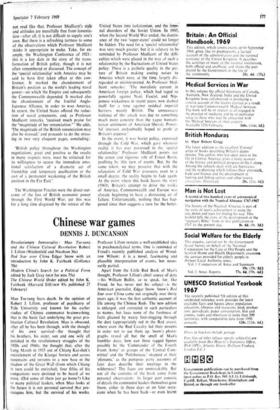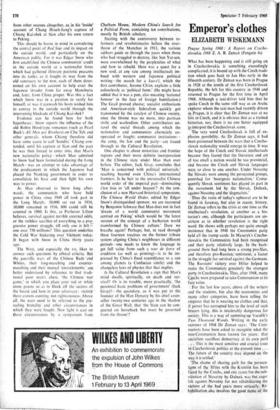Chinese war games
DENNIS J. DUNCANSON
Red Star over China Edgar Snow with an introduction by John K. Fairbank (Gollancz 70s) Modern China's Search for a Political Form edited by Jack Gray (our for Rim 75s) The Chinese World Order edited by John K. Fairbank (Harvard $10Jour 95s published 27 February) Mao Tse-tung fears death. In the opinion of Robert J. Lifton, professor of psychiatry of Yale University and known for his earlier studies of Chinese communist brainwashing, that is the basic fact underlying the great pro- letarian Cultural Revolution. Mao is obsessed, after all he has been through, with the thought of his own survival—the thought that his brothers, his sister, son and one wife all perished in the revolutionary struggles of the 1920s and 1940s; the thought that, after the Long March in 1935 out of Chiang Kai-shek's encirclement of the Kiangsi Soviets and across mountains and torrents to a new base in the shadow of the Great Wall (from which Chiang in turn could be encircled), four fifths of his companions were destined to be heard of no more. (Did some of them just go home?) Like so many political leaders, when Mao looks at the future it is not personal survival that pre- occupies him, but the survival of his works.
Professor Lifton restates a well-established idea in psychoanalytical terms. One is reminded of Freud's recently published analysis of Wood- row Wilson: it is a novel, fascinating and plausible interpretation of events, but neces- sarily partial.
Apart from the Little Red Book of Mao's thought, Professor Lifton's chief source of data —his William Bullitt, so to speak, for, like Freud, he has never met his subject—is the American journalist, Edgar Snow. Snow's Red Star over China came out originally over thirty years ago; it was the first authentic account of life among the Chinese Reds. The new edition is enlarged, and corrected in such particulars as names, but loses none of the freshness of facts gleaned by weary foot-slogging through the dust (appropriately red in the Red areas), where even the Red Cavalry led their mounts in order not to use them up. Snow's photo- graphs reveal all but the smell of Mao's Inimbler days; how can these ragged figures possibly be the 'Commander of the Fourth Front Army' or groups of the 'Central Com- mittee' and the 'Politbureau,' snapped at their 'plenums,' as the pompous party accounts of later days describe their meetings in the wilderness? The faces are unmistakable. But not all the contents of the book come from personal observation: its larger part consists of details the communist leaders themselves gave Snow, either in those days or on later occa- sions- when he has been back—or even learnt
from other sources altogether, as, in his 'inside' account of Chang Hsueh-liang's capture of Chiang Kai-shek at Sian after his own return to Peking.
This should be borne in mind in considering the central point of Red Star and its impact on the outside world, and particularly on the American public. For it was Edgar Snow who first established the Chinese communists' credit in the outside world as a nationalist force which had gathered illiterate patriotic peasants into its ranks, as it fought its way from the old sanctuary to the new, each of them deter- mined on his own account to help evict the Japanese invader from far away Manchuria and, later, from China proper. Was this a fact which Snow was in a position to verify for himself, or was it eyewash his hosts wished him to convey to the outside world through the intervening blockade of Chiang Kai-shek?
Evidence can be found here for both hypotheses : Snow reports the influence of the old Robin Hood-type romances (such as Pearl Buck's All Men are Brothers) on Chu Teh and other generals, whom Chiang therefore did have some cause to call 'bandits.' Chiang con- tended, until his capture at Sian and the pact he was then forced to enter into, that Mao's new nationalist policy—which Mao admitted to Snow had been formulated during the Long March—was an attempt to take advantage of the predicament in which the Japanese had placed the Nanking government in order to consolidate his base and then fight his own way to power.
As Mao observed to Snow long after- wards, the communists who have held power in China since 1949 all took part in the Long March: 50,000 set out in 1934; 10,000 remained in 1936, 800 could still be counted in 1960. Is this, as Professor Litton believes, survival against terrible external Odds; or the ruthless sacrifice of everything to a pro- gressive power struggle, till only one is left-- one over 750 millions? This question underlies the Cold War bickering over Vietnam* today. It began with Snow in. China thirty years ago.
The West, and especially the us, likes to answer such questions by ethical criteria. But - the guerrilla wars of the Chinese Reds 'and Whites, their long-marching and counter- marching and their mutual 'encirclements,' are- better understood by reference to that tradi- tional poor man's chess, 'the Chinese war game,' in which you place your red or white • stone pawns so as to block off the sectors of _ the board and hem in your adversary : victory there crowns cunning, not righteousness. Above all, the wars need to be referred to the pre- vailing brutality and other circumstances in which they were fought. New light is cast on those circumstances by a symposium from . Chatham House, Modern China's Search for a Political Porm, containing ten contributions, mostly by British scholars.. t
Starting with the controversy between e and revolutionaries before the . over-
throw of the Manchus in 1911, the various authors guide us through the years when those who had struggled to destroy, like Sun Yat-sen, were overwhelmed by the perplexities of what and how to rebuild. Here was a quest for a new soul, at any rate among intellectuals im- bued with western and Japanese political writing—the search for a kuo-t'i, which the first contributor, Jerome Ch'en, explains a little colourlessly as 'political form.' (He might have added that it was a pun, also meaning 'national honour' in the face of foreign humiliation.) The Grail proved elusive; socialist enthusiasm and American-style federalism quickly got transmuted by the catalyst of Chinese society, once the throne was no more, into partisan strife and warlordism. Other contributors un- ravel the social threads among which the nationalists and communists alternately co- operated or fought; communist institutions— the army, the law and the party—are traced through to the Cultural Revolution.
One chapter is about minorities and frontier- regions and their more definite incorporation in the Chinese state under Mao than ever before. The editor, Jack Gray, concludes that 'Mao is concerned with political universals,' reaching beyond even China's international frontiers. Is he heir to the universalist Chinese world order of the imperial past—dominating tien hsia or. 'all under heayen'? At the con- clusion of a new Harvard historical•symposium, The Chinese World Order, edited by Edgar Snow's distinguished sponsor, we are reassured by Benjamin Schwarz that Mao does not in fact 'dream of a world communist movement centred on Peking' which would be 'the latest version of the concept of a' barbarian world transformed by Chinese culture.' Dare we breathe again? Perhaps; but, to read through these fourteen treatises on the former tribute system aligning China's neighbours in different periods—one needs to know the language to get full value from such a tour de force of erudition (as well, as printing)—is to be im- pressed by China's fixed resemblance to a sun among planets (a Confucian simile) and the changeless laws of physics that that implies.
Is the Cultural Revolution a sign that Mao's mind dwells, spiritually, on death and sur- vival? Or is its trouble, more practically, :the perennial basic problems of government' (Jack Gray)?—the quandary, as it was put to the . founder of the Han Dynasty by his chief coun- sellor twenty-two centuries ago in the shadow of the Great Wall, that 'the State can be con- quered on horseback but must be governed from the throne'?







































 Previous page
Previous page